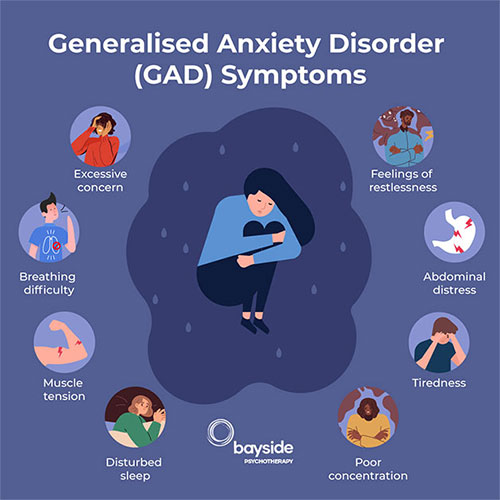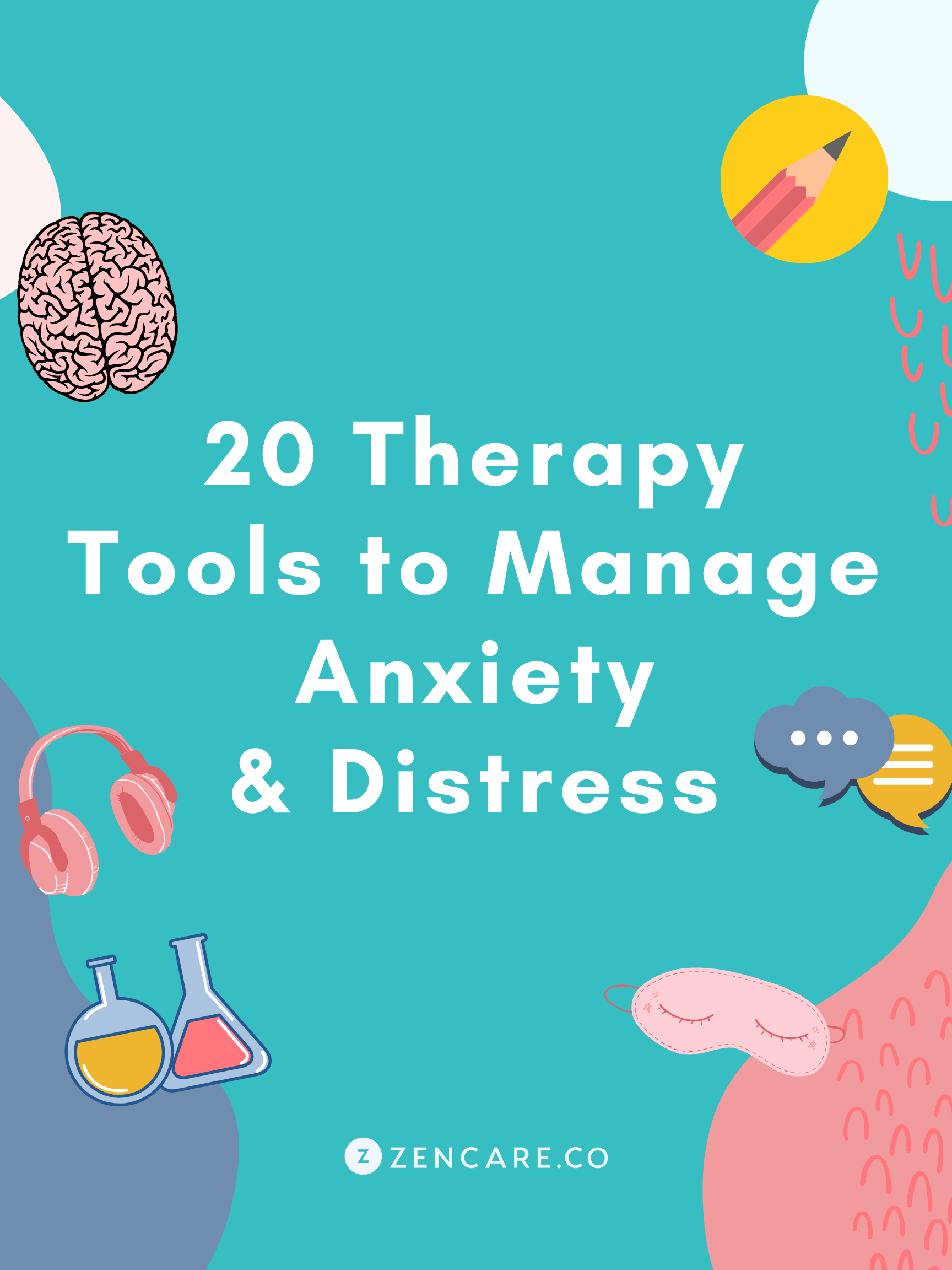Exploring Various Approaches in Counselling for Anxiousness Disorder for Long Lasting Adjustment
When taking on anxiety problems, it's crucial to discover a selection of therapy approaches. Each method offers unique insights and devices to aid you handle your signs and symptoms effectively. You could locate that incorporating strategies can generate the very best outcomes. Understanding the subtleties of these approaches is crucial to cultivating enduring adjustment. Suppose the best combination could release a new level of emotional well-being for you?
Recognizing Anxiousness Conditions: A Quick Overview
Stress and anxiety conditions, which affect numerous people worldwide, can considerably affect daily life. You could experience frustrating feelings of fear or stress that appear irrepressible. These sensations can result in physical symptoms like an auto racing heart, sweating, or also dizziness. Typical sorts of anxiety problems consist of generalized anxiousness condition, panic disorder, and social anxiety problem. Each has one-of-a-kind indications, but they all share a propensity to disrupt your regular and relationships.Understanding the origin of your stress and anxiety is vital. It could stem from genes, brain chemistry, or life experiences. Acknowledging your triggers can help you manage your feedbacks better. It's vital to keep in mind that you're not the only one in this battle. Many individuals encounter similar difficulties, and seeking aid is a solid action toward feeling much better. By finding out about stress and anxiety disorders, you're already on the course to understanding and handling your condition better.
Cognitive-Behavioral Treatment: Challenging Unfavorable Idea Patterns
In Cognitive-Behavioral Treatment, you'll start by identifying the unfavorable idea triggers that contribute to your stress and anxiety. As soon as you identify these ideas, you'll service changing them with even more favorable choices. Together, you'll build efficient coping methods to help manage your anxiety in day-to-day situations.
Identifying Adverse Thought Triggers

When you run into minutes of distress, acknowledging the certain triggers behind your negative ideas can be important in managing anxiousness. Beginning by focusing on circumstances that provoke sensations of fear or fear. Is it a congested space, a future target date, or a discussion with particular individuals? Jot down these circumstances in a journal. This will help you identify patterns in your reasoning. Notification physical feelings that accompany your adverse ideas, like a racing heart or tightness in your upper body. By identifying these triggers, you acquire insight right into what's fueling your anxiousness. Comprehending these links is the primary step in challenging those ideas and eventually restoring control over your psychological responses.
Changing Ideas With Positives
Challenging adverse idea patterns is a crucial action in changing your state of mind and decreasing anxiety. You may usually find on your own caught in cycles of insecurity or devastating thinking. Rather than allowing these ideas determine your sensations, technique replacing them with realistic options or favorable affirmations. As an example, when you think, "I can't manage this," move it to, "I can handle difficulties one action at a time." This simple change can greatly influence your emotional state. Regularly determining and countering these unfavorable thoughts helps produce a much healthier internal discussion. Keep in mind, it takes some time and effort, but continually practicing this strategy can bring about lasting change, empowering you to face stress and anxiety with renewed confidence and resilience.
Building Coping Approaches Together
Changing unfavorable ideas is only the beginning of handling anxiety effectively. To create enduring modification, you need to construct coping techniques that empower you. Cognitive-Behavioral Treatment (CBT) assists you recognize and test those purposeless thought patterns. With each other, you and your therapist can check out how these thoughts impact your sensations and behaviors.Start by establishing useful methods, like journaling or mindfulness exercises, that permit you to face stress and anxiety head-on. When you face your anxieties slowly, you'll discover to react in different ways.

Mindfulness and Acceptance-Based Approaches: Growing Present-Moment Understanding
As you browse the intricacies of anxiety, incorporating mindfulness and acceptance-based techniques can considerably enhance your capacity to cultivate present-moment recognition. By concentrating on the below and now, you'll discover that you can observe your thoughts and sensations without judgment (Counseling services for anxiety). This technique helps you acknowledge your stress and anxiety without really feeling bewildered by it.Engaging in mindfulness exercises, such as deep breathing, body scans, or assisted reflections, enables you to ground yourself in your existing experience. Acceptance-based strategies motivate you to welcome your feelings instead of fight versus them. They lose their power over you.Incorporating these techniques into your everyday routine can transform how you respond to anxiety when you accept your sensations. You'll develop strength and find out to navigate stressful situations with greater ease. Inevitably, growing present-moment recognition lays the foundation for enduring adjustment, equipping you to lead an extra fulfilling life
Direct Exposure Treatment: Challenging Anxieties Gradually
Direct exposure therapy assists you challenge your fears in a gradual way, making it less frustrating. You'll learn strategies to deal with anxiety-provoking situations step by action, while also developing coping methods to manage your reactions. This strategy empowers you to take control and decrease stress and anxiety with time.
Steady Direct Exposure Methods

When facing stress and anxiety, progressively confronting your worries can be an effective method to regain control. This technique, called steady exposure, includes slowly subjecting on your own to the situations or objects that trigger your stress and anxiety. Beginning with less intimidating situations and progressively function your method approximately more tough ones. If you're scared of public talking, you might begin by speaking in front of a mirror, after that proceed to sharing thoughts with a friend, and at some point resolve a small team. Each step helps desensitize you to the worry, constructing your confidence with time. Remember, it's important to rate yourself and commemorate little triumphes as you move with this process, enhancing your capacity to handle anxiety properly.
Building Coping Strategies
Building efficient coping strategies is vital for taking Related Site care of anxiety, particularly as you challenge your fears gradually - Counseling services for anxiety. One powerful approach is direct exposure treatment, where you begin by encountering your concerns in a controlled way. Start with much less frightening circumstances and gradually function your method as much as more tough circumstances. This progressive exposure helps desensitize you to anxiety triggers, making them much less overwhelming.Incorporate leisure methods, such as deep breathing or mindfulness, to soothe your mind during exposure. Track your progression, commemorating little success along the way to boost your self-confidence. Bear in mind, it's fine to take your time; the goal isn't perfection but constant enhancement. By developing these techniques, you'll empower yourself to browse stress and anxiety and embrace life much more completely
Psychodynamic Therapy: Revealing Source of Anxiety
Psychodynamic therapy explores the subconscious mind, exposing the origin triggers of your stress and anxiety. By examining your ideas, feelings, and previous experiences, this strategy aids you discover underlying conflicts and unsolved problems that might add to your current anxiousness. You'll work with a specialist to check out childhood experiences, partnerships, and emotional patterns that form your reactions today.As you gain insight right into these much deeper layers of your psyche, you'll begin to recognize just how past occasions influence your existing habits. This understanding can lead to catharsis, allowing you to refine feelings you might have suppressed.Through the healing partnership, you can likewise recognize defense devices that may have established with time, providing a more clear path to alter. Ultimately, psychodynamic therapy outfits you with the tools to resolve your anxiety at its core, promoting long-term change in your psychological well-being.
Integrative and All Natural Strategies: Combining Methods for Greater Efficiency
Integrating various restorative strategies can enhance click here for info your journey toward taking care of anxiousness better. By combining aspects from cognitive-behavioral treatment, mindfulness techniques, and holistic methods, you can develop a personalized method that resolves your special requirements. You could make use of cognitive-behavioral methods to test unfavorable thought patterns while integrating mindfulness exercises to ground yourself in the existing moment.Additionally, discovering all natural techniques such as yoga or meditation can advertise leisure and minimize stress and anxiety signs. This blend allows you to create higher self-awareness and resilience.Experimenting with these diverse methods can aid you uncover what reverberates most with you. Keep in mind, it has to do with finding a harmony that functions, as opposed to staying with a single approach. This integrative strategy not just uses instant relief but likewise promotes lasting abilities for managing anxiety, empowering you to reclaim control over your life.
The Role of Support Systems: Structure Durability Through Link
While it might appear that managing anxiousness is a singular trip, having a solid support system can play a vital role in your resilience. Bordering yourself with understanding good friends, household, or support system creates a secure space where you can honestly share your experiences and sensations. When you link with others, you advise yourself that you're not the only one in this struggle.These partnerships provide motivation and can provide sensible coping approaches that have benefited others. It's additionally a possibility to obtain viewpoint; buddies can aid you see circumstances in different ways, minimizing sensations of isolation.Moreover, emotional support promotes a feeling of belonging, which can considerably ease stress and anxiety signs. By leaning on your support group, you can build durability and take on challenges better. Remember, getting to out for aid suggests stamina, and it can make all the difference in your trip towards taking care of anxiety.
Regularly Asked Questions
What Are the Common Signs of Stress And Anxiety Problems?
You could experience uneasyness, exhaustion, trouble focusing, impatience, muscular tissue stress, and rest disruptions. Physical signs and symptoms can consist of quick heart beat, sweating, and shivering. Acknowledging these indications early can assist you seek suitable support and treatment.
For How Long Does Therapy Usually Last for Anxiousness Disorders?
Treatment for anxiousness problems commonly lasts anywhere from a couple of weeks to a number of months. It truly relies on your private needs, progress, and the strategies your specialist utilizes to help you manage your anxiousness properly.
Can Medicine Be Used Alongside Treatment for Stress and anxiety?
Yes, medication can certainly be used along with therapy for anxiety. Incorporating both techniques typically enhances therapy efficiency, helping you take care of signs while exploring underlying concerns with therapy (Counseling services for anxiety). Constantly consult your doctor for tailored recommendations
Are There Self-Help Methods for Handling Anxiousness?
Yes, there are a number of self-help approaches for handling anxiety. You can exercise mindfulness, participate in normal exercise, keep a balanced diet regimen, develop a routine, and use deep breathing techniques to aid decrease anxiousness symptoms properly.
How Do I Know if I Required Specialist Assistance for Anxiousness?
